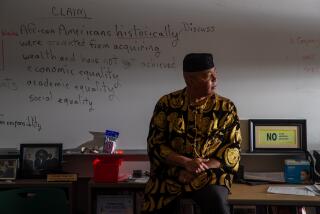A Passion That Could Be Better Directed
- Share via
Just because I loves you
That’s de reason why
My soul is full of color
Like de wings of a butterfly
Just because I loves you
That’s de reason why
My soul is fluttering upon itself
When you pass by
When the nationally acclaimed poet Langston Hughes wrote these lines, he was using what I understand to be Ebonics. His substitution of “de” for “the” consistently throughout the poem reflects a systematic replacement that is characteristically African American. This is not slang and it is not the speaker’s attempt to subvert so-called standard English. It is a representation of the intimate language of my community.
What must be made clear, beyond the need for further discussion, is that Ebonics historically has not created a barrier that has been problematic for African Americans. Ebonics reflects not a lack of intelligence but a history of language acquisition in a context of slavery and then segregation. One has only to review the history of African Americans’ pursuit of education and literacy, even when to do so was to court death, and to review their contributions to society to understand that mastery of English has never been a central problem in our struggle. That Ebonics has surfaced related to the education of contemporary black youth results from a nexus of problems in inner cities that have weakened the power of the community that in the past was the “village” that raised black children. The core issue in deciding whether to mandate that teachers understand Ebonics is clear to me. It is about black youth being so uncomfortable in the classroom that this becomes a place where maximum learning cannot occur.
In my 26 years of teaching at Cal State Northridge, African American students often have expressed their unwillingness to spontaneously participate in classroom discussions when surrounded by white students. This is in no way attached to their sense of the value of their ideas but rather to their self-consciousness. They’ve explained that any tinge of characteristically African American speech patterns (and they are not talking about slang) will detract from how well their ideas are received and support other students’ sense that they do not belong in the classroom. Although they have mastered standard English, in moments of heightened fluidity there is the chance of seepage.
How well I remember the constant reminders my generation received about the importance of proper grammar and the power of eloquent presentation of self through language. Our elders knew that the expectation others had of us, in spite of our triumphs, was colored by the shadow of a once-prevailing belief in our innate inferiority.
I can hear the chorus of disclaimers that will greet these words.
But walk a mile in my shoes! What would be your response if people regularly felt moved to comment on how articulate you are, even though you are a professor, with a doctorate, teaching English and literature? This comment is strikingly out of place when it occurs in environments where being articulate is a given for participation.
Ebonics is but a strategy proposed to address the problem of African American children being penalized at the starting gate because of their linguistic presentation of self. My concern is that the passions society attaches to issues where race is central are too often misplaced. Why is such broad-based dialogue and such heated passion connected to Ebonics, but not to the issue of 75% of urban black youth being failed by the education system; to the need for change in the jury system in the wake of the O.J. Simpson verdict, but not to the history of this same system as it has failed African American men and women?
Whatever the outcome of the Ebonics debate, the larger issue that deserves our attention and passion is the horrendous job being done in educating black urban youth.
More to Read
Sign up for our Book Club newsletter
Get the latest news, events and more from the Los Angeles Times Book Club, and help us get L.A. reading and talking.
You may occasionally receive promotional content from the Los Angeles Times.








